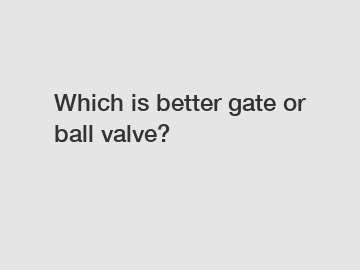Which is better gate or ball valve?
Which is better, gate valve or ball valve? This is a commonly asked question in the field of valve selection. The answer to this question lies in the specific application and requirements of the user. In this article, we will delve into the characteristics and advantages of both gate valves and ball valves, examine their respective strengths and weaknesses, and ultimately determine which valve is better suited for different situations.
To begin with, let us first understand the basic structure and function of gate valves and ball valves. A gate valve operates by sliding a gate up and down to control the flow of fluid. It is typically used in applications where a full-flow is desired, as it provides a straight-through passage when fully open. On the other hand, a ball valve uses a spherical ball with a hole in the middle to regulate the flow. It offers a quick and easy on/off operation, making it ideal for applications that require rapid shut-off or precise flow control.
When it comes to the sealing capability, gate valves are known for their excellent sealing properties. The gate, when fully closed, provides a tight seal against the seats, preventing any leakage. This makes gate valves suitable for applications where leakage is a major concern, such as in the oil and gas industry. In contrast, ball valves may experience some degree of leakage, especially the soft-seated ones. However, advancements in ball valve design and materials have significantly reduced this issue, making them reliable in most scenarios.

In terms of flow characteristics, gate valves have a linear flow pattern, meaning the fluid passes through the valve in a straight line. This can minimize pressure drop and turbulence in the pipeline, making gate valves suitable for applications where a smooth flow is essential. On the other hand, ball valves have a more versatile flow pattern. They can provide different flow configurations, such as full port, reduced port, and multi-port options, allowing for greater flexibility in system design.
Further, considering the maintenance aspect, gate valves are generally easier to repair due to their straightforward design. In the event of a malfunction, the gate can be easily replaced, minimizing downtime and maintenance costs. Ball valves, though more complex in construction, offer advantages in terms of longevity. The ball and seats are often made from durable materials such as stainless steel or reinforced polymer, ensuring excellent wear resistance and extended service life.
In summary, both gate valves and ball valves have their unique characteristics and advantages. The choice between the two depends on the specific requirements of the application. Gate valves excel in sealing properties and linear flow, while ball valves offer versatility and ease of operation. As industries evolve and new technologies emerge, valve manufacturers continue to enhance the performance and reliability of both types of valves. Therefore, it is crucial to consult with experts and consider factors such as fluid properties, system requirements, and budget constraints when selecting the appropriate valve for a given application.
The company is the world’s best China slab gate valve factories, China slab gate valve supplier, high quality slab gate valve supplier. We are your one-stop shop for all needs. Our staff are highly-specialized and will help you find the product you need.
234
0
0


Comments
All Comments (0)